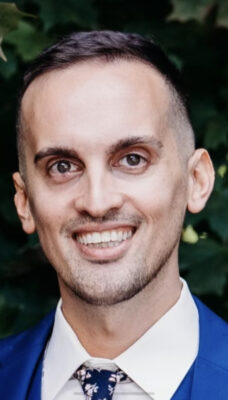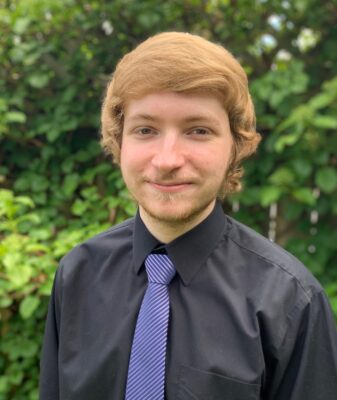Special to GradImpact: Student stories from our Master’s Degrees at Work campaign.
It was Jared Cucinotta’s own experience with a school psychologist in middle school that inspired him to pursue a career where he can help kids who are struggling like he did.
For Marcus Lombardo, he knew he enjoyed working with kids, and wanted a career that would allow him to work with kids while using data to improve student outcomes.
For both Cucinotta and Lombardo, it was important to them to be able to have jobs where they can help others and work in their communities, which led them to getting their master’s degree in the School Psychology program at State University of New York (SUNY) Oswego.
Both students are also part of the Cultivating Representation in School Psychology (CRISP) initiative, a five-year $3.5 million grant to SUNY Oswego from the Department of Education to fund fellowships and internships for students, as well as a paid internship and guaranteed placement with the Syracuse City School District.

Jared Cucinotta
Cucinotta just finished his last semester of coursework and starts his internship with the Syracuse City School District in the fall. Lombardo just finished his first full year in the program. He has another year of coursework and then will also have a year-long internship with Syracuse City School District.
A school psychologist was there for Cucinotta at a difficult time when he was coming out to his family in a conservative community. His struggle was not only affecting his mental health, but his physical and academic health as well.
“I thought, okay, I’m not the only person going through this. There are other people who are different and who are being treated poorly because they are different,” Cucinotta said. “There are people out there struggling and I personally saw a difference in myself after talking to a professional. From a young age I just knew I wanted to help others.”
He decided to pursue becoming a therapist when he got to college, but during his undergraduate program he was exposed to more jobs in the psychology field and thought school psychology was interesting.
“You get to work with the entire public. For a therapist, it’s individuals seeking you out, whereas for a school psychologist, it’s every kid in that zip code,” Cucinotta said. “That’s what I love about it- I get to work with people who maybe wouldn’t be able to get psychological services.”
Lack of access to mental health resources is an issue for many people, even those that do have health insurance. Often, health insurance only covers a limited number of visits to a therapist.
“A lot of the kids I work with, they don’t have the means to see a private psychologist,” Cucinotta said. “It’s important for me to take a career path that would work with the most vulnerable people.”
Cucinotta said that New York requires school psychologists to have a master’s degree to practice, and he feels that the graduate level education he is receiving is essential to being a good school psychologist.
“Personally, I think you need this training. I would not have been ready for this job after four years of college. There’s a big difference between your undergraduate education and the graduate level. It’s more like job training,” Cucinotta said. “And I want that job training. I want to learn as much as I can so I can go out there and be the best psychologist I can be.”

Marcus Lombardo
Lombardo was working in the Rochester City School District during undergrad when he realized he really enjoyed working with kids and wanted that to be a part of his career. After taking a psychology course, he switched his major from American Studies to psychology and began considering master’s programs so he could be competitive in the job market.
“I’ve always wanted to have a job where I’m using my skills to help other people who need it, especially kids,” Lombardo said. “But I also want to help people in an evidence-based and data-oriented way. So that kind of led me to psychology as opposed to school counseling or mental health counseling.”
Lombardo says that it’s important to him to use his career to help improve the lives of others.
“It’s like an internal need to have a sense of purpose in my career, and to use whatever privilege I have in life to help other people who haven’t been as fortunate,” Lombardo said. “A lot of the struggles that I saw in Rochester with poverty, they were tied to various social inequities. I want to do something to help make the world a better place and help those kids reach their full potential so that someday the world can be better because they were given the tools that they needed to succeed.”
Lombardo likes using data to help assess students because he feels it’s more objective and can eliminate biases, and it can help people see larger issues at play.
“You can use data to show what areas students are actually struggling in because sometimes we can be biased in how we look at things,” Lombardo said. “When you have more objective ways to collect data, you can use that to guide interventions and see what students are struggling with across the board. Then, [you can] see what interventions might be needed across the whole school district or across the whole county, to really help as many students as we can at once.”
Lombardo also thinks that it’s important for school psychologists to be aware of what’s happening to students outside of school and how it impacts their ability to reach their fullest potential.
“When you are working with students, they are bringing in the problems that they deal with at home and in their neighborhoods. You can’t just focus on the school issues, you also must look at poverty and racism- those things will always be barriers,” Lombardo said. “So as school psychologists, the struggle is to figure out how to help them academically, but I think that we can do a better job of connecting students with resources and being experts in what they can lean on in their community.”
Lombardo has enjoyed the work so far and has become close to his small cohort in the program.
“It’s been a great experience. There’s only seven of us in the cohort, so it’s a very tight-knit group. “We’ve gotten to know each other well, since we’ve gone through everything together,” Lombardo said. “It’s a difficult program and it’s a lot of work. But overall, I think it’s going to be worth it in the end.”
